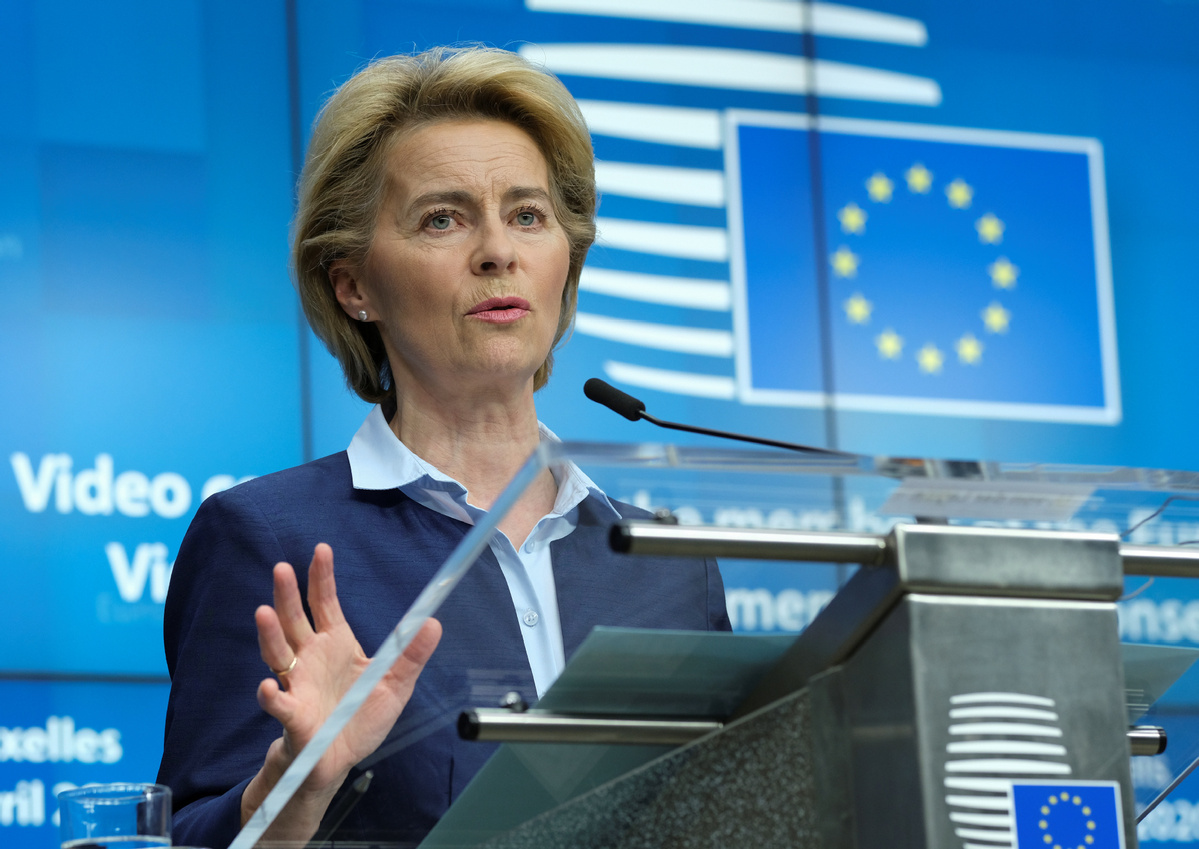EU's leaders agree on need for recovery fund, but details not set


European Union leaders have agreed to prepare a recovery fund to help its member states salvage their economies, which have been hit hard by the the COVID-19 pandemic, but details of the plan have yet to be worked out.
After a four hour-plus videoconference on Thursday, EU leaders called on the European Commission to come up with a detailed plan.
Ursula von der Leyen, president of the European Commission, said she was happy that the leaders gave her commission the task of shaping the collective response to the crisis.
"We have to design a common, future-proof answer to this, to ensure the integrity and the cohesion of the single market and its shared prosperity," she told the media after the summit.
She said the scale, speed and impact of the economic crisis are unprecedented in modern times, with some countries hit harder than others.
"And unless we act decisively and collectively, the recovery will not be symmetric and divergences between member states will increase," she said.
The agreement on Thursday came after widespread news coverage in the past weeks of a major disagreement between members in the south and north over the recovery fund.
It also came a week after von der Leyen extended a "heartfelt apology" to Italy for the EU members' not coming to its aid early enough.
A poll last month by the news agency Dire found that 88 percent of Italians felt they had been let down by their EU allies. A new survey by pollsters Bidimedia on April 15 and 16 found that 40 percent of Italians would support quitting the EU and scrapping the euro as its official currency, UK's Daily Express reported on Friday.
Von der Leyen said on Thursday that the European 2021-27 budget is the only way to meet the magnitude of tasks needed for the recovery.
European Council President Charles Michel said on Thursday that EU leaders expressed "a strong will to move forward together" and "work toward establishing a recovery fund".
"This fund shall be of a sufficient magnitude, targeted toward the sectors and geographical parts of Europe most affected, and be dedicated to dealing with this unprecedented crisis," he said.
EU states, especially Italy and Spain, have been hit hard by the pandemic, with their numbers of cases and deaths trailing only the United States.
The unfolding economic crisis, widely regarded as the worst since the Great Depression, is a major test for von der Leyen and Michel, both of whom took office in December.
Italian Prime Minister Giuseppe Conte, who was critical of the EU's earlier response, described Thursday's agreement as "an important milestone in European history".
Italy, Spain and France had pushed for a eurobond recovery fund for weeks, only to be met with strong opposition by Germany, Austria, the Netherlands and Finland.
That opposition was no longer there on Thursday, though details of the recovery fund are yet to be decided. The leaders will meet again in about two weeks.
German Chancellor Angela Merkel indicated on Thursday that she was open to offering major financial support for the recovery fund, as much as 2 trillion euros ($2.16 trillion), but wanted to see how it would be used before committing the money.
"It was clear to everyone that we need such a recovery fund," Merkel told the media.
"I want to say very clearly that such a joint solution is in Germany's interests, because things can only go well for Germany if they go well for Europe," she added.
During the videoconference, European Central Bank President Christine Lagarde warned EU leaders that the eurozone's GDP could fall 15 percent under the most severe scenario, according to EURACTIV.com.
Meanwhile, the Geneva-based World Health Organization has launched an international initiative to accelerate the development of COVID-19 health technologies.
The collaboration was launched at a virtual conference co-hosted by WHO Director-General Tedros Adhanom Ghebreyesus, French President Emmanuel Macron and von der Leyen, the European Commission president.
By launching the initiative, the WHO and its partners aim to "ensure all people have access to all the tools to defeat COVID-19", said Tedros.

































